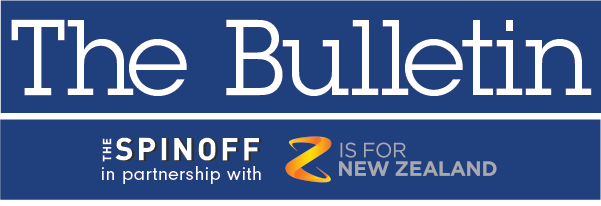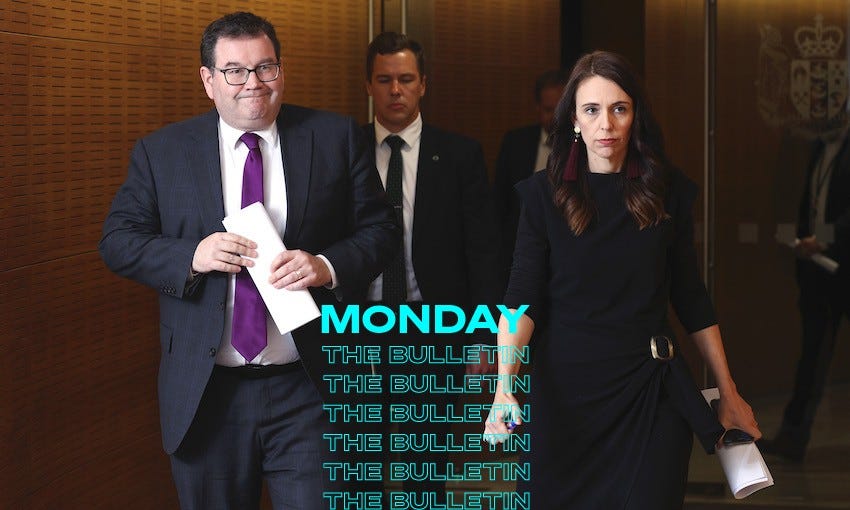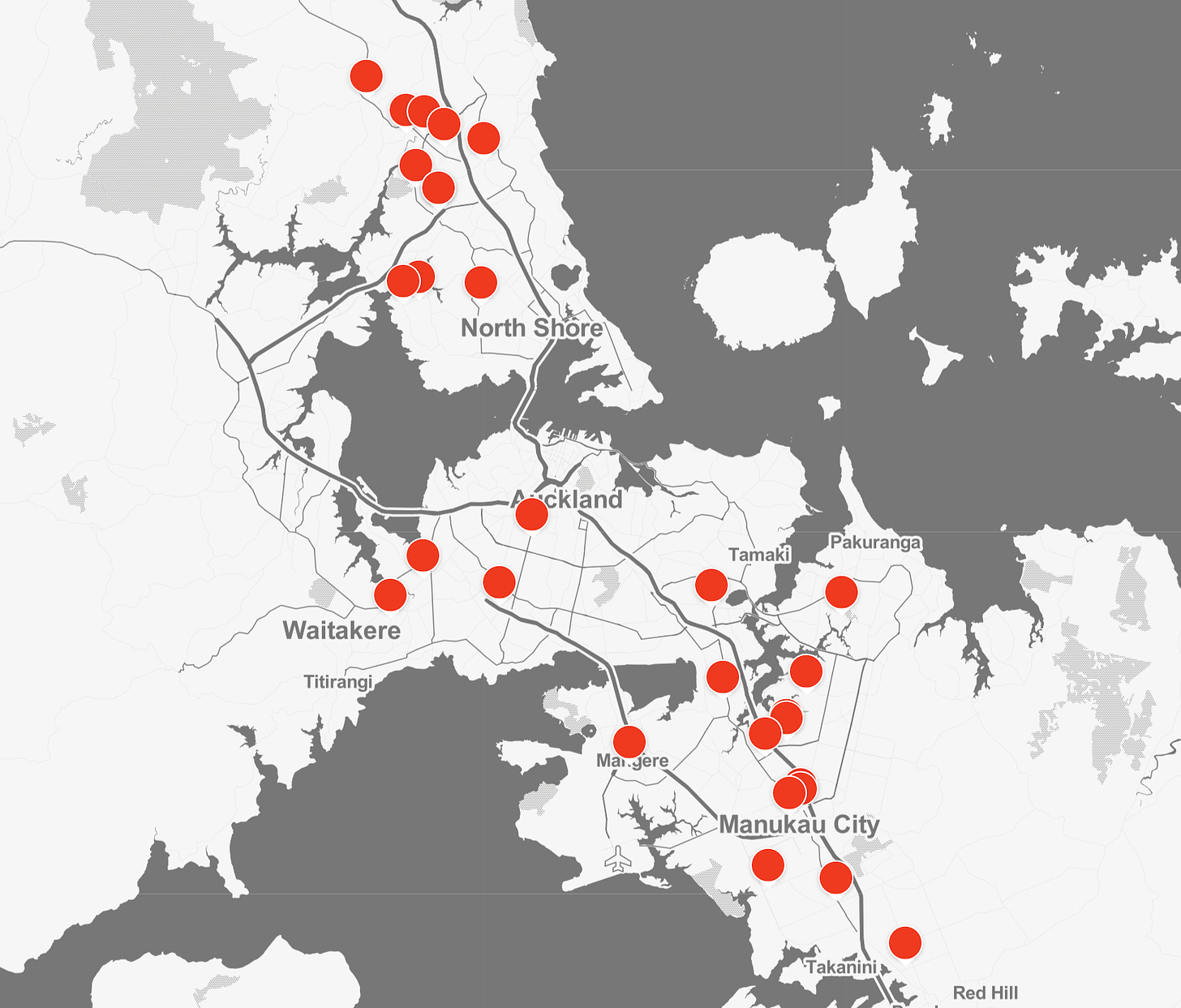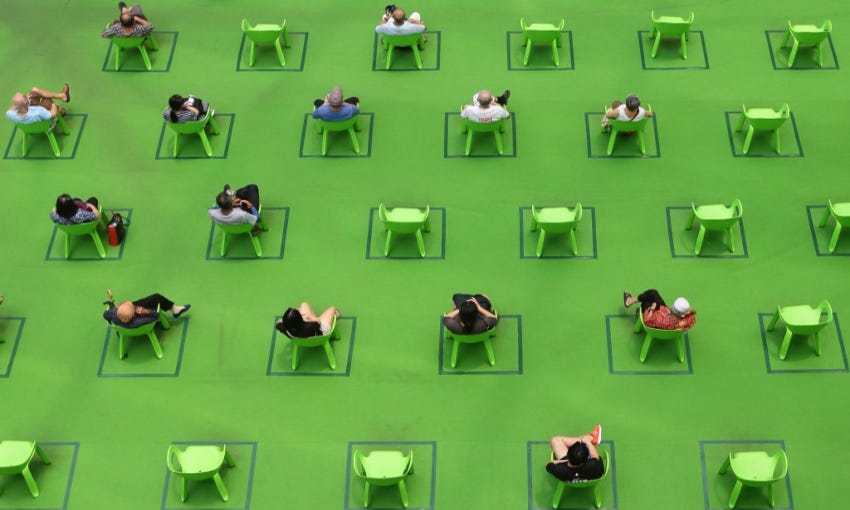Waikato locks down as Auckland decision looms
The prime minister says Auckland’s delta outbreak from August is now effectively over as new cases appear across the border in Waikato
Mōrena and welcome to The Bulletin for Monday, October 4, by Justin Giovannetti. Presented in partnership with Z Energy.
In today’s edition: The Pandora papers; Air NZ to ban unvaccinated on international flights; the end of the Auckland cycle bridge; but first, a snap lockdown in Waikato.
PM Jacinda Ardern and deputy PM Grant Robertson (Hagen Hopkins/Getty Images)
New Zealand is now facing a second outbreak after cases were detected in Waikato. Speaking yesterday at an unscheduled press conference, the prime minister didn’t rule out a move to level two for Auckland this week despite two new infections detected south of the city. With swathes of Waikato now in level three lockdown, Jacinda Ardern said the delta outbreak that started in August has now “essentially ended” and the country faces a second outbreak centred around five active sub-clusters. She promised to share a “roadmap” for ending Auckland’s restrictions this afternoon after a cabinet meeting. However, a return to level four lockdown won’t be part of the plan.
The Spinoff’s live updates has all the details on the new level three lockdown in parts of Waikato.
There’s a near unanimous call from experts urging the government not to move Auckland to level two. The weekend was a difficult one for New Zealand’s Covid-19 response. Two new cases were detected in Waikato that haven’t yet been linked to the Auckland outbreak, an Auckland-based truck driver found himself in Palmerston North when his positive test came through and a large protest was mounted in the middle of the country’s largest city against restrictions. As Newsroom reports, experts say it’s too early to move Auckland out of lockdown when mystery cases are still appearing every day. Even the prime minister’s chief science advisor tweeted out, in response to the story above, that the consensus is clear.
David Welch, a senior lecturer at the University of Auckland, told the Science Media Centre that the current alert level might not be enough:
“With an increase of cases and in particular unlinked cases over the last few days, it is clear that level three is not working to eliminate the outbreak. Modelling suggested that the move from level four to level three was a risk. We have not landed on the right side of that risk.”
There seems to be a shift in emphasis from the government’s approach. Getting into a debate on the elimination strategy isn’t very helpful, but it does appear that the definition is changing. As Stuff reports, the strategy is at a possible fork in the road with cases spilling over Auckland’s border following seven weeks of lockdown and the creation of what is, in effect, a large pocket of restrictions within a different region. The prime minister said this latest lockdown could have been avoided if more people were vaccinated, which is likely true, but even the director-general of health only got his second jab yesterday. Testing will also need to pick up now in Palmerston North, with the Manawatū Standard reporting that queues were longer at a McDonald’s than a neighbouring testing centre.
Keeping a lid on Covid-19. Both National and Act claimed yesterday that the government has “lost control” of the outbreak. As cabinet meets today, it’ll be weighing its options carefully, including the public’s mood for a longer lockdown in Auckland. I had expected an inevitable announcement yesterday from the prime minister that Auckland’s restrictions had been extended. It seems unlikely that cabinet didn’t consider it as it voted to move parts of Waikato to level three. Instead, Ardern seemed to set up a reason to end Auckland’s lockdown by stating that the city’s August outbreak is effectively over despite 163 new cases over the past week. The NZ Herald reports that data modeller Shaun Hendy has said the city should stay in level three until 90% of its eligible population is vaccinated, something that could take many more weeks. While cabinet might not vote tomorrow to end Auckland’s lockdown, it likely won’t be willing to wait that long either.
New locations of interest from Covid-19 cases reported in Auckland yesterday up to 9pm.
If you like what you’re reading, we need your support. The Spinoff is doing our utmost to keep you updated on Covid-19 related news. Every dollar our members contribute directly funds our editorial team and is devoted to ensuring we do more. Click here to learn how you can support the team today.
The Pandora papers throw a spotlight on the wealthy. A massive leak of millions of documents, believed to be the largest ever, has revealed how the powerful have used secret offshore financial arrangements to shield their wealth from scrutiny and tax. The NZ Herald, part of a global consortium that tackled nearly 12 million documents, has chronicled how New Zealand-based trusts became involved in a global money machine, protecting the identities of oligarchs, billionaires and corrupt foreign politicians who sent fortunes here.
Air NZ to ban unvaccinated travellers from international flights. The airline’s chief executive told One News that the decision follows “overwhelming” feedback from staff and customers that the measure will make them feel safer. The ban will apply from February 1 of next year. The move also reflects the number of countries that Air New Zealand flies to that won't let unvaccinated travellers in. In a similar decision, the government announced yesterday that all non-New Zealand citizens entering the country will need to be fully vaccinated by November 1. The Auckland Business Chamber also said yesterday that the city’s businesses want a “no jab, no job” mandate for staff. Expect many more of these announcements over the coming weeks.
The Covid numbers: 32 new community cases were reported yesterday in Auckland and 1 in Waikato*. 52% (14) of the previous day’s total were in the community while infectious. There are now 250 active cases. 50,067 people were vaccinated on Saturday, of which 74% were second doses.
*The second Waikato case will be in tomorrow’s numbers.
The Spinoff’s Covid data tracker has the latest figures.
No arrests or fines issued as more than 1000 attend Auckland anti-lockdown protest. Jacinda Ardern said the protest, led by Destiny church leader Brian Tamaki was “a complete slap in the face to every Aucklander”. While the event was significantly over the 10 person gathering limit for the city, police issued a statement of disappointment and said a number of people hadn’t worn masks or kept social distancing. Tamaki denied what police saw and said people kept to their bubbles. The NZ Herald reports that a number of experts said the gathering was an unnecessary risk.
The cycle and walking bridge across Auckland harbour has been cancelled. The government pulled the plug on the $785 million project on Saturday morning after the crossing of the Waitematā harbour faced stiff criticism since it was unveiled, Stuff reports. After years of proposals for a cycleway over the harbour, public opinion swung against a government project which was seen by some as an extravagance. However, after a mass protest on the harbour bridge by cyclists in May, it’s likely the decision won’t be greeted with enthusiasm by those who want a bike-friendly option. The government says it’ll continue looking for a new crossing focused on public transit.
The sale of a boutique mine in a Coromandel protected area has led to fears it’ll now expand significantly. RNZ reports on the hobby mine which has operated for over 20 years at a small site in Coromandel forest park, under DOC’s highest level of environmental protection. It’s a small affair where only hand-held tools are allowed. That could now change after its new owner, a larger Australian gold miner, has said it’ll expand the site significantly underground. Environmental groups warn the purchase could be a “Trojan horse” to allow the company to go beyond what was ever expected under the site’s special permit.
A guide to the country's favourite indoor plants. Demand for house plants has soared under lockdown, with some people needing the perfect string of pearls for their Zoom background while others bring in a fiddle leaf fig to take over the parlour. RNZ has written an explainer to help the country’s aspiring green thumbs care for their new plant friends. Don’t overwater those pearls and the fiddle needs some light, but keep it out of that harsh nearly-summer sun. It can be tough but it’s worth it. Bonne chance.
Got some feedback about The Bulletin, or anything in the news?
Get in touch with me at thebulletin@thespinoff.co.nz
Socially-distanced seating in Singapore in March 2021. (Suhaimi Abdullah/Getty Images)
Right now on The Spinoff: Rosie Collins writes that opening up won’t be easy, just look to Singapore for the right lessons. Emma Vitz looks at the evolution of New Zealand baby names and finds they’ve become increasingly unique. Perzen Patel explains her lifelong love with dosa, the South Indian breakfast staple, and how to make it at home. Mary Breheny and Octavia Calder-Dawe, two psychology researchers, report that optimism can be helpful but there’s a real dark side to constant positivity messaging. Anna Yeoman explains why it’s time to keep cats confined at home, in short, Boots and the gang are killing our native fauna.
For a feature today, the case for regulating the world’s social media giants. During the prime minister's recent 1pm press conferences, her Facebook stream has been swarmed by anti-vaxxers uttering falsehoods. Asked about it, Jacinda Ardern has been nonchalant and said she expects the social media giant to clean it up. It hasn't. Duncan Greive writes for The Spinoff about the need to get real with Google and Facebook. As he explains, the two companies are brilliant and provide us with “free” services too numerous to describe. In exchange, they do enormous damage to society and ask us to pay. It’s time to treat them like big oil and big tobacco. Here’s a sample:
One more thing to know about Google and Facebook: for all their phenomenal, unprecedented scale and power, they are also almost entirely untaxed and unregulated in this country. In fact, we know very little about them. They don’t declare how much money they really make locally, and despite being among the most profitable companies in the world, they make almost no contribution to our tax base here, siphoning a massive and fast-growing fire-hose of money back to Northern California but leaving little here to pay for the public services we require to function as a society.
The All Blacks' skipper says the team needs to improve. It wasn’t the result they wanted and One News reports as much from Ardie Savea after the captain has promised to improve following the team’s loss 31-29 on the Gold Coast to South Africa. The tight loss on a penalty after the buzzer follows a tight win in the final moments of a game the week before. According to the NZ Herald (paywalled), being humbled after losing to the world champions is a blessing for a team that has flaws and needs to correct them. Two near-miss wins would have robbed them of the push to get better.
That's it for The Bulletin. If you want to support the work we do at The Spinoff, please check out our membership programme.








